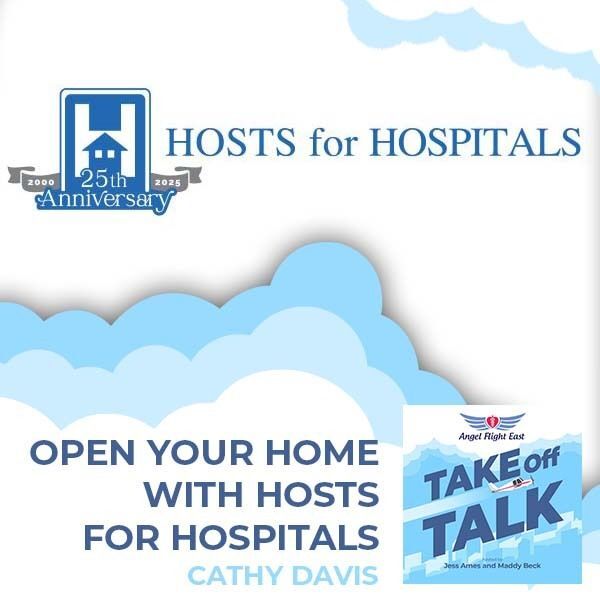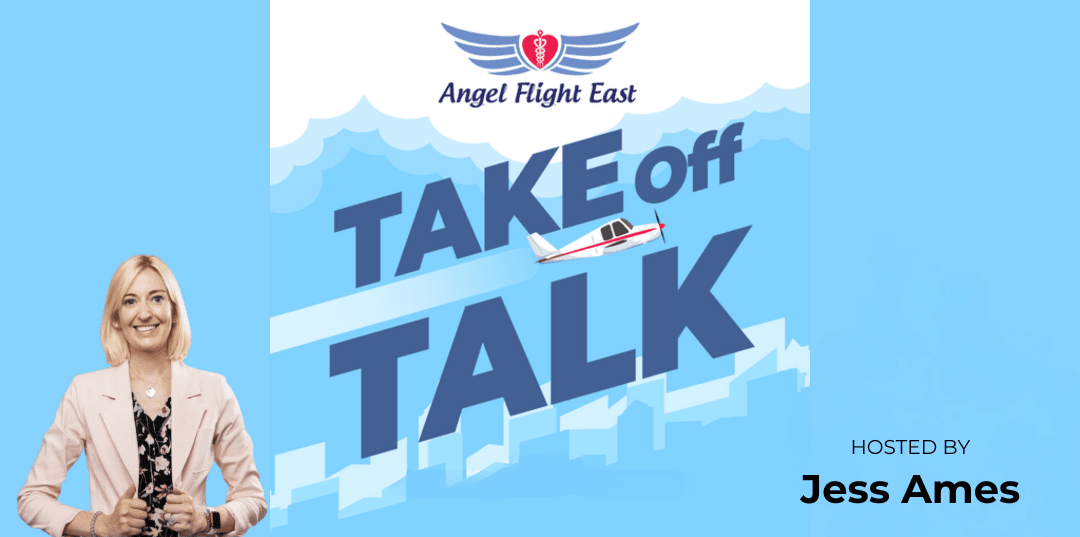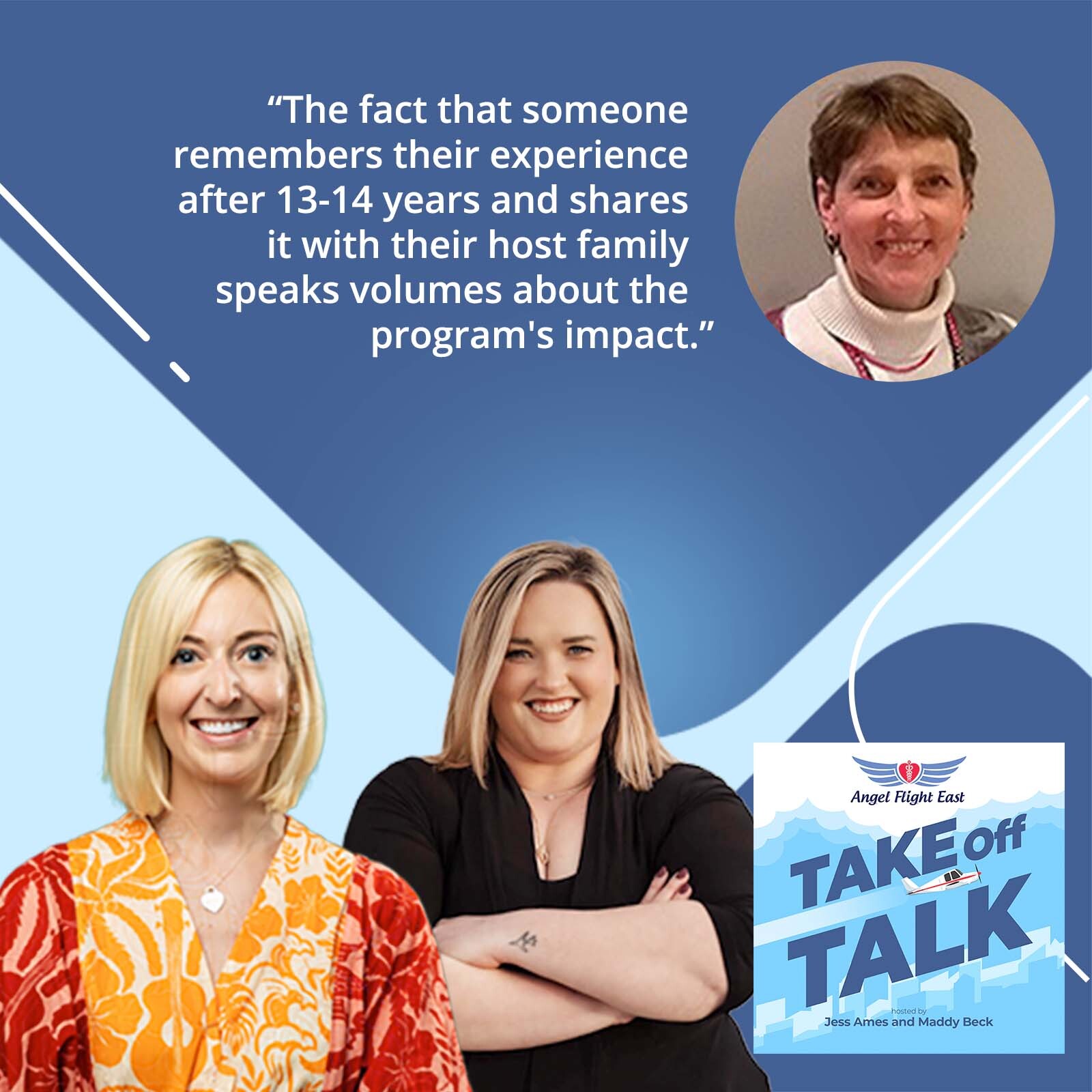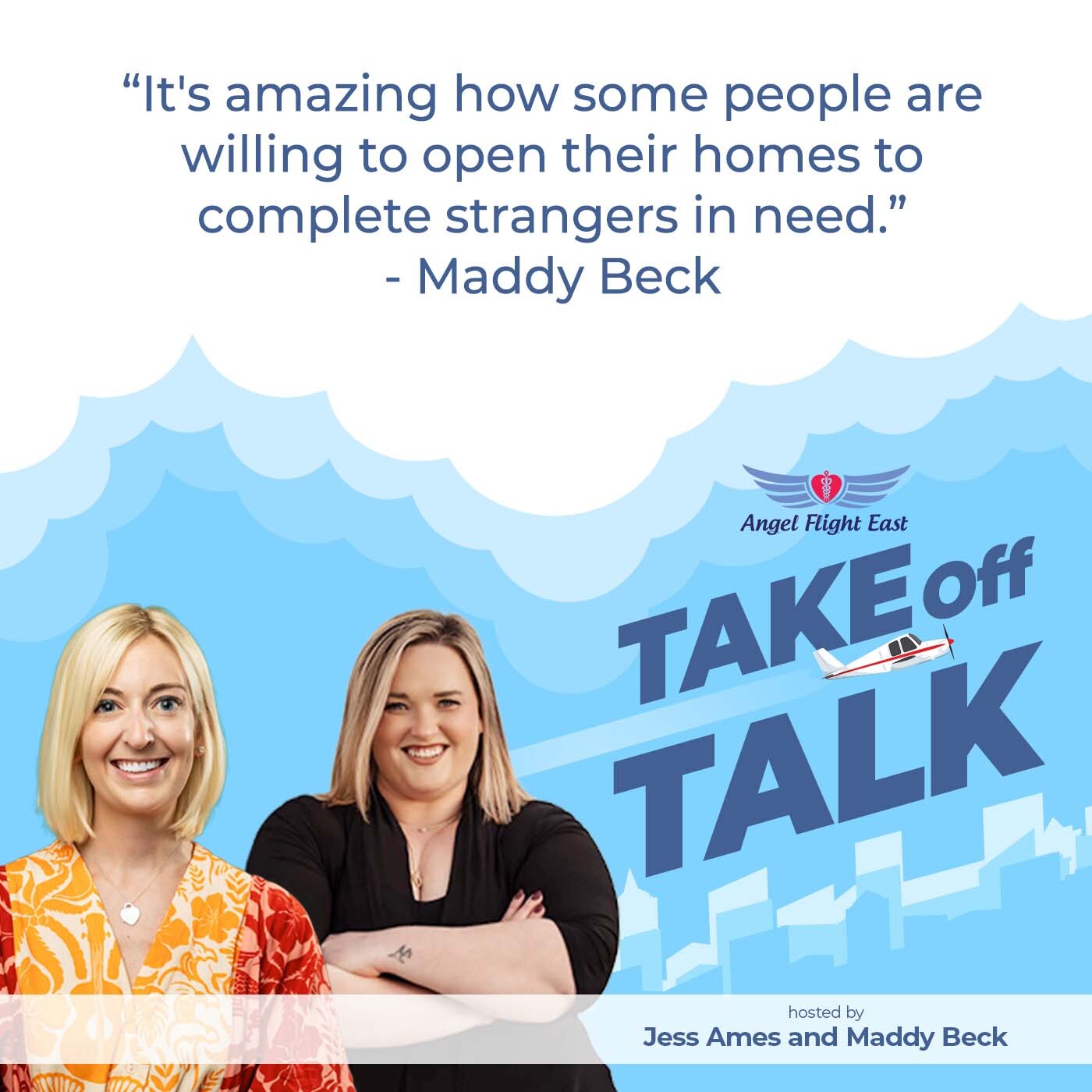
Have you ever considered opening your home to someone in need? In today's episode on Take Off Talk, Maddy and Jess chat with Cathy Davis, the heart and soul behind Hosts for Hospitals, a local non-profit providing a lifeline for patients and families facing medical challenges. Listen and discover how Hosts for Hospitals offers a unique alternative to traditional hospital housing, creating a warm and welcoming environment for families traveling for specialized care. Cathy explains why becoming a host is an enriching experience, fostering connections and offering comfort during difficult times. She also shares inspiring stories about the program's impact on hosts and guests. You will also discover how YOU can get involved, open your home, and be part of something exceptional. Tune in for a heartwarming conversation that will inspire you to make a difference in others' lives.
---
Watch the episode here
Listen to the podcast here
We have Cathy from Hosts for Hospitals.
Hello.
Hosts For Hospitals
Cathy, do you want to share with our listeners a little bit about the organization?
Hello. Thank you very much, Jess and Maddy, for inviting me to be here. I love talking about the organization always and doing it with a smile because my heart and soul are into it. It's an organization called Hosts for Hospitals, which is a local nonprofit started 25 years ago. We offer lodging and support to patients and their families coming into this area for specialized medical needs.
That's a long way of saying it runs like Ronald McDonald House, because people say, “It's just Ronald McDonald House.” It is, but it's out of our volunteer host homes. We are not just for children. We will service anybody. It started 25 years ago, and people pay very little to stay at our volunteer host homes. If there's a hardship, we certainly would work with them as well.
What is your role at the organization?
I've been an outreach coordinator for seven years, but I've been a host for 15 years. The beauty about being the outreach coordinator is that when I speak to people, I can speak from experience because I was a host long before I was the outreach coordinator. I have a lot of stories and a lot of experiences, both good and bad, that I can speak to people about.
I don't know if I want to ask you more about your experience working with the organization or your experience helping the organization.
We're all good.
How did you get involved fifteen years ago?
Well, I had seen a blurb, and this is usually what happens. It's something that goes into my head, and I'll put it on the back burner till someday. I was at a different house at the time, and it just wasn't the right timing, but I had heard about the organization. When I went to my current church, which is St. Paul's Episcopal Church in Chestnut Hill, it came back up again, and here two people there were already hosts for Hosts for Hospitals.
I started working on the outreach committee at St. Paul's, and Hosts for Hospitals was one of the outreach recipients, the grant recipients from St. Paul's. In the meantime, I moved to a different house, a little bit bigger and a little bit more conducive to hosting. That's where I started since there were already two, but all the signs were pointing to me that this was the time for me to do it. That's how I became a host.
That's pretty cool. It's meant to be.
Yes, that's a God link.
I know since you are the outreach person, Maddy and I have had experience sharing tables with you and sharing what you guys do as well because I feel both of our organizations were a little bit of a best-kept secret in Montgomery County in the Philadelphia area. This is why we invited you on, just to get the word out and raise awareness about what Host for Hospitals does too.
I know we've even had people on the podcast talk about using Host for Hospitals. I think it was Liam's mom.
I think you're right. That's great.
It's just so cool, and it's such a crazy thing to think about, just volunteering to say, “Yes, please come and stay with me, kind stranger.”
It is different. You have to be the right person. It is easier than you think because our hosts are not responsible for meals or transportation. You don't even have to be home. Some of our hosts say that they will be going down the shore for two weeks and they want to host while they're away. They still like the idea of it, but they don't feel comfortable with them being in the house.
“Becoming a host is easier than you think because our hosts are not responsible for meals or transportation. But you've got to be the right person.”
Over and over, it tends to be the people who are comfortable with opening their homes up. They feel as though their home is meant to be shared. It's people a lot of times that do exchange students, which we do, or a lot of different ideas, but exchange students keep coming up, or host family members a whole lot. Some people have done this for hospitals but didn't realize that there was an official organization that does it. They signed up with us. Some people did it just because they were connected with one of the hospitals.
How are the families that are being hosted finding you?
There are a couple of different ways. In the best scenario, the social workers at the hospital or the medical people at the hospital will refer them to us. They'll say, “We know of this great organization, and here's the brochure, or here's the connection to that.” That's the best scenario because they're the first line of fire. They're the people who are face-to-face with the patient's families.
The second could be they find it themselves online. Now, we are listed under accommodations. If you go to the hospitals, Penn CHOP, and trainers, we are listed under accommodations. A lot of times, people will recognize Ronald McDonald House and they'll recognize the Marriott Hotel. If we get lucky enough for them to come down to our organization and read about it, if we're that lucky, they don't believe that people are that kind, that people will let them say their house.
That being said, they could find us under accommodations. They could find us by Googling. Some people have just found us by Googling housing in Philadelphia for medical needs. Another way could be through other guest patients. We always encourage our guests to refer other guests to us. They do a lot of times, but that would be a fourth way of finding out. Another would be for you to tell them, or for our partnering organizations to tell them about us.
Is there a financial restriction? Like does everybody have to make X amount of dollars, or do they have to be in town for X amount of time or anything like that?
No Income Restrictions
There are no restrictions like that. There are no income restrictions at all. People do perceive that it would be people of lower income or menial needs or something that, or for specific medical needs, but we have no requirements on income. I tell people that if you stay at a hotel for a week, it's a financial hardship period, no matter what income level you're in.
You're getting weak at night sometimes. Right.
It was funny you said that because I was just in my speech or during my presentation. I'm back, and it costs somebody a discounted hotel of $87 plus tax and insurance, and it's over a thousand dollars a week. I ran into somebody from the CHOP list. She looked at me and she said, “No, after COVID, we are at the $230 level for one night. That $87 is long gone for the discounted rate for a hotel IN University City.
I think they'd have to offer their firstborn to get $87.
Yes. I said, “I'm way back, I have to revamp my presentation on that.”
How many people would you say hosts for hospitals a year on average?
I'm going to I'm not the housing coordinator, so I'm not sure about this, but I would say probably over a thousand nights, not people, but nights, we work on nights. I would say over a thousand nights per year.
That's incredible. Are there requirements on the housing side? Let’s say, I have an extra bedroom, list my house as available. What are the requirements on that side of things then?
When I hear over and over people say, “I would like to do it, but I have a dog.” “I would like to do it, but the only bedroom I have shares a bathroom with X.” That's all acceptable. The only requirement is that it's a private bedroom. The bedroom has to have a door that closes. They can share a bathroom. Your house can have a dog or a cat or animals, whatever that is. They do share a bathroom at my house with one of my daughters when she's home from college. The requirement is just a bedroom with a private door that closes.
How does the matching work with host families and families that are coming in and need a house?
Matching Hosts With Guests
When the guest puts an application online with our housing coordinator, they usually speak with her as well. They list what the requirements are. They list whether they need minimal stairs, whether they have marginal mobility, or whether they're allergic to pets. In the application, they put that in. Me, as the outreach coordinator, when the hosts come in, I go out to the house myself and I take my notes on the house.
I count how many steps they have. I count how many pets they have. I note whether they have a twin bed or a full bed. People think I'm doing a white glove test on their house, but I'm not. I need our notes to know what they have to offer. Whatever you have is okay, but I need to write it down. At that point, after the guests put their application in, then it goes out to our network, a brief outline of the case goes out to our host network and they volunteer.
In that process, Barbara will know whether their house is going to be appropriate for that case. But they will know whether the house is appropriate for that case. The people with dogs will know if the case says “allergic to pets,” they will not offer their house. If it says “minimal stairs required” and the guest room is on the second or third floor, they know they can't offer their house. Usually, they know by the outline of the case whether they can offer their house.
Now the good part, we need to know the stories, the good and the bad.
Inspiring Stories From Cathy
I have funny stories. I have no bad stories, but I have funny stories. I would say, one of the best stories would be from a year ago at Christmas. I received an email that said, “Dear Cathy and Joe, it's been a long time since I last wrote you, and I hope you're doing well. I was talking with Carlotta about how blessed we have been in the past by having people who shared their houses and friendships with us. I'm hopeful that you still have this email and wish you the best for your family. They must be all grown up by now. With much appreciation and thankfulness.”
I read this email and I did not remember who it was. Fortunately, I saved all the 10,000 emails I have and I went back. I Googled the name. His name was Roberto and I had hosted them in 2009. That's how impactful this was. That's one of my best stories. That's how impactful the program is that somebody's remembering it 13 or 14 years later and talking to their family.
They stayed with us. They had one child that was brain injured and they came into the area for service on that. They had two other children with them and they didn't speak English. The father was the only one that spoke broken English, but the family did not. They stayed with us for probably less than a week. Thirteen years later, they were just sending this email out. That was my gift and that was a great story.
Probably the funniest story is that I had one woman stay with me a few years ago, and I would say it was my husband's least favorite one. She had two children with brain injuries, which was very sad. They were home a lot during the day. They had some services they had to do during the day, but they were here. I was out working and she was with the two children all day.
My husband's a high school teacher. At 03:30, when he gets home, he's ready to cool down but at 03:30, when an adult got home, she was ready to talk. She needed adult interaction. He’s not a talker to begin with. That's certainly not required of the program, but she was ready for a complete full-face adult interaction, and he was not.
He said, “I would go into different rooms and she would just find a way to come into the room and start talking to me.” That was not a bad story at all, but it was one of our funnier stories. The other one, there was a family from Russia and Ukraine and they were in their late 20s. They had a one-year-old child with a brain injury.
In the program they were coming in for, they needed a caregiver with them. It happened to be the mother-in-law, which was the father's mother. It was a strange dynamic between the mother-in-law and the daughter-in-law. They were in for family care for the baby and the mother was in to do it for her son. They were a multi-blended family, but he was from Saudi Arabia and they tend to do it on their sons a little more. That was a very strange dynamic, watching the mother and daughter-in-law interact. That was another funny story at the house, but there are so many great stories.
Becoming A Host
I can't even imagine. I'm such a social person. I feel I'd be like, “What are you guys going to do today?” “Do you want to get lunch?” I feel that I'd be the worst host. They say, “Please never send me back to that house.”
That's the thing. Our hosts have to take the cues from the guests on whether they want to talk or whether they don't. Some are very private and just stay in their room most of the time, which is why they need a private room. They're dealing with a lot of issues and some of them do want to talk and they need to talk about it.
“Our hosts should take cues from the guests on whether they want or don't want to talk.”
Another one was at somebody else's house after her first hosting experience. She sent an email in and she said, “I'm not sure how much good I did. They only stayed at my house for two nights. When the woman came home from CHOP, she just gave me a big hug and started to cry.” She didn't even know what it was, but whatever it was, she got bad news from the hospital. That in itself was a huge help to the family that came in. My host appreciated being there and she didn't know how much she helped, but she did.
I almost feel like it's similar to our pilots. It's just an extra layer of comfort, especially for people coming from another country who have never been here before. It's probably.
Gary coming for your child's medical appointment and you just don't know anything and just to have an actual home and not a hotel is probably just a small layer of comfort that they wouldn't even think of.
Yes, we have examples of people that have gone to Longwood Gardens and they don't come in to do this entertaining, but sometimes depending on what program they're in for, whether they have extra time or not, our hosts do take them. They might take them to the Liberty Bell or to Longwood Gardens or something depending on what their time is.
Now are these patients both international and United States residents?
Yes, they're both. I don't know, I'm going to say it was probably 60% domestic and maybe 40% international but yes, it can be both. They just have to be outside of the area where they can commute regularly every day. Some of the hospital hospitality programs locally have requirements that they have to be 45 miles away or a couple of other different requirements. We do not require that.
We do have guests that come from Lancaster. We do have guests that come from the Poconos. It's just a little too far if they're receiving radiation or treatment daily. It's just too much to commute every day so they can stay with our program. We don't have a requirement on where they are. We tend to have domestic and international people. We do have many internationals as well.
That's awesome. Is there a final thought that you would leave our readers with?
There are lots of ways. I would encourage all of our readers to go to our website first of all. Familiarize yourself with the organization, Hosts for Hospitals. By seeing its visual, if you go on the website, you see it, you understand it a little bit more. Get us connected with any of your community organizations. At the Rotaries, we constantly have Jess and all, and I probably both speak at Rotaries a lot.
Community organizations, places of worship and connect us with events. Even if you go to our website and you can't be a host, which is fine, we're always looking for hosts. I encourage people to try it once. Then if it's not the right fit for you, don't do it again. You can get on our email list and send out emails to other people, to your network to tell other people about it.
A lot of times when those emails go out with the pictures of the patient's families, obviously with their acknowledgment, the pictures will go out. The pictures are very impactful and we get a lot of hosts with that. We encourage you to go to the website, get on our email list, and connect us with your places of worship or community organizations. That would be great to do even if you can't be a host.
We all have a network or a handful of people that you know work at CHOP or Shriners. Tell them about it. It's not just us looking for hosts, it's also looking for us to tell people at the hospitals about the organization. You don't know how many times they sit at an event and they haven't heard about us. We'll say, “We service you mostly, CHOP more than anything. How can you not know?”
You are preaching to the choir here. Cathy, speak in our language.
Even not on the host side, but on the hospital side of it, anybody you know who works at the hospital. Please connect them or try to connect them. Also, I would tell them our gala is coming up. I know you are hugely successful when your annual gala, but we do not have an annual gala. We are having a 25-year gala in 2025.
We would love people to connect us for that. If they like our mission, if they like our organization, connect with us by donating something like an experience or a gift or helping us on one of the committees for the gala. That'd be great. That's coming up and would be a huge benefit and a way they could help out if they like what they hear about the organization.
We will be at your gala. We love a gala.
Yes, we love a good event.
It's being organized. It got sidestepped by COVID. We were going to do it during COVID and then got sidestepped. It's next year. I will say another success of the story. I want to talk about a story that just happened this weekend. Two people Saturday morning, and sometimes it ebbs and flows, but on Saturday morning, we got two different calls from women whose husbands were in the local hospitals.
We got the calls at about 09:00 on Saturday morning. One, her husband had had a heart attack while he was driving and he had been in the hospital. She was from one of the Jersey shores and he had been in the hospital. Now, he was getting transferred to Moss Rehab. She contacted us and needed lodging for one to three weeks starting that night.
A second one called, similar timing from Lancaster, and her husband was having liver and bowel issues. Some of these things are not covered by the other hospitality homes, like Gift of Life and Ronald McDonald House. They weren't under 21. They were not coming in for an organ transplant. They did not have cancer.
They had bowel and liver issues. She was coming in the next day on Sunday, which was yesterday, for one to three weeks, possibly longer. Within an hour, we put it out to the network, and by 12:00, we had fifteen offers from our networks for these two. They were placed immediately. We have a huge success and people are on our email list, they could see these coming out and send it out and help us just that.
That’s awesome.
That's amazing. Thank you so much for sharing all about Host for Hospitals and we hope the word gets out to everybody.
Thank you so much. Thank you for making people aware and thank you for what you do. We want to partner more. I know Jess and I sat in an event at the Shriners seven years ago. Why would we not partner? People are like one-stop shopping. We can do the transportation and the lodging together and may take that off of the people's plates.
Yes, it just makes sense for us to partner. We love it.
Yes, sign us up.
Thank you so much. I appreciate it.
Bye, Cathy.
Have a great day, bye.
I had a really funny thought during that whole interview.
I had many intrusive thoughts, but you go first.
I thought about individually, you, me, and David, what would we each be if we were a host?
David would just be like, “Here you go.” “Would you like my Bud Light body pillow for your slumber?
I would be like, “I don't want to stay here anymore.”
My god, I love David. When you just asked me that question, I immediately thought of that time that you tried to get Anthony to let you host the guy walking.
Take in the stranger? The guy walking across America. That was a great idea but I am also not a super social person. I would love to open up my home, but I would not want somebody who wants to talk all the time because I do agree with her husband. When you come home from work, you just want to compress and relax. I don't know if I could do it.
It'd be a lot of people.
It was a great service. I guess you have to outweigh that.
I'm not a good sleepover friend. I'm the friend who'll say, “You know that we don't have to stay up all night, right? We can go to bed. Going to sleep is fun, too. We don't have to watch another episode of this show.” Or, “I'm just going to go. Have fun.” “There's snacks in the corner, bye.”
I don't know what you're talking about. You're a great sleepover friend for that reason because you go to sleep at 08:00 PM.
I don't want to say it. Please don't make me.
We're in our PJs and I think we had face masks on and then Corinne called and said, “Meet me here.” We're like, “Dang it, we got to take our face masks off?” Then we went.
This episode made me just think about how I currently need to get her stuff out of my house so I can turn her room into a host for a hospital room.
I'd stay there.
That's fun. Just have to like Lucy and Sheldon. Maybe not. I have two basset hounds and they don't have manners.
Sheldon does.
No, he doesn't. Sheldon has less manners than everybody. Sheldon is the biggest basset hound I've ever seen in my life.
He's 90 pounds. I don't know.
Maybe we'll have to think about this.
We need to have ideas. My wheels are turning. Then I was also thinking, are they like foster kids? Do you have to have extra sheets for them? I guess she said you don't have to provide anything.
It's almost an Airbnb. I feel you would have to provide for them. We're just going to lie in and sleep on an empty mattress.
I would feel inclined.
I feel I would cook for them too. I’ll say, “You have enough to worry about it. Here's a casserole.”
Casserole? Having a lasagna?
Some bacon-baked cookies.
No, I feel you would say, “Yes, please come stay at my home. Maddie, please come cook for my sick people.”
Yes, they’ll say, “This is my person.”
This is my plus one. Anyway, everybody gets the website. Go check it out. Hopefully, we will see you at their gala. If not, just give them a follow on social media and share the word about what they do.
Yes, what she said, she's my plus one. Bye.
Important Links
- Cathy Davis - LinkedIn
- Hosts for Hospitals
- Partner Organization, Love From Liam Foundation With Ashlyn Dugan









